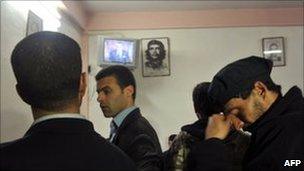Morocco's King Mohammed pledges constitutional reform
- Published

The king did not make any direct reference to the upheaval in other Arab nations
Morocco's King Mohammed VI has promised "comprehensive constitutional reform" in the north African country.
In his first national address since last month's nationwide protests, the king said that "individual and collective liberties will be expanded".
He said he would give up the power to name the prime minister, who would be chosen by parliament.
This meets some of the demands of street rallies, similar to those seen in Tunisia and Egypt.
Protesters want some of the king's powers to be handed over to a newly elected government.
'Our model'
"We have decided to undertake a comprehensive constitutional reform," King Mohammed said in the televised speech to the nation.
He said that a committee had already been set up to work on the revisions, with proposals to be submitted to him by June.
The monarch added that more powers would be given to Morocco's regions, saying it would help consolidate "our model of democracy and development".
He would also hand over some powers to the prime minister.
It was his first public speech since thousands of people rallied in several cities on 20 February.
Some rioting did take place, especially in the north, where five people died at a bank that was set on fire, but there were otherwise few clashes between protesters and the police, who had been ordered to avoid confrontation.
Since then, young activists have been using social networking websites to call for major rallies on 20 March "for dignity and large-scale political reforms", including a constitutional monarchy.
Morocco has also been facing severe economic problems.
King Mohammed has said the fight against poverty and high unemployment is his priority, but some non-government groups say little has changed.
Morocco - like Egypt and Algeria - does allow limited freedom of expression and has so far been able to contain protests.
Like Jordan it is a monarchy with strong support among sections of the public.